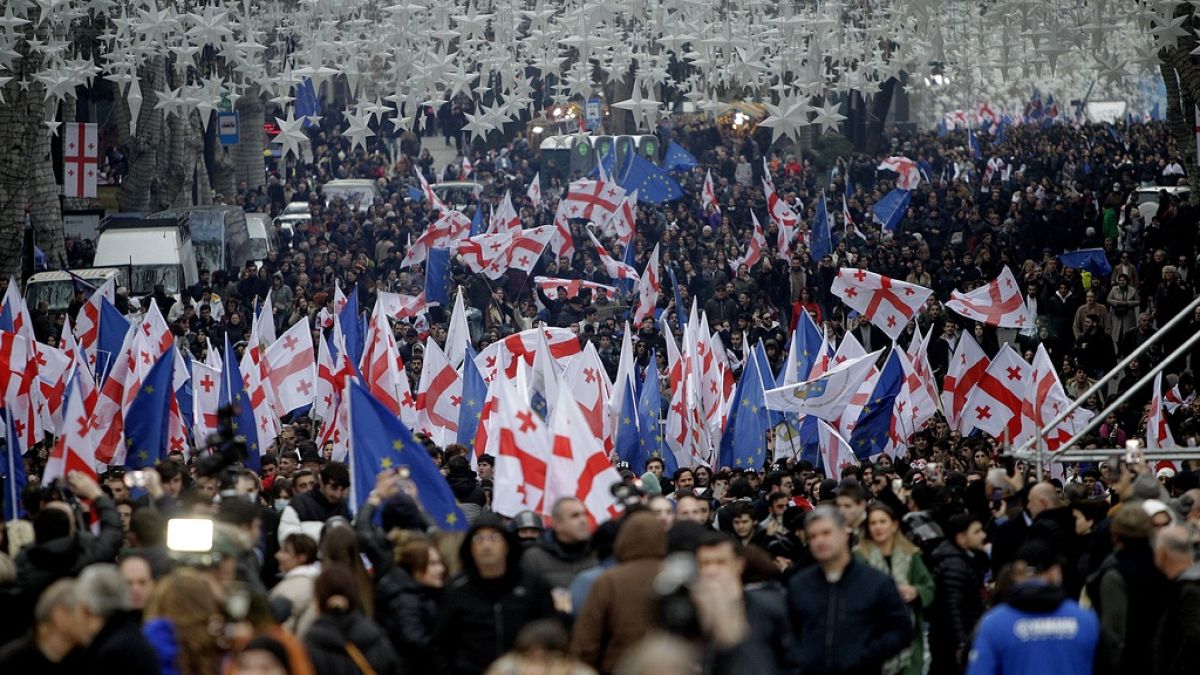
It’s a big step forward to joining the bloc of 27 European states, although analysts caution it could still take many years to complete.
Lawmakers in both the Moldovan and Georgian parliaments waved EU flags and played the bloc’s anthem at Friday’s opening of their parliamentary sessions.
The announcement came despite strong opposition from Hungary – and the fact that Ukraine and Georgia are partially occupied by Russia which also has troops deployed in Moldova’s Transnistria region.
Thousands of Georgians gathered in the country’s capital Tbilisi on Friday to celebrate in and around Freedom Square.
“The EU and integration with Europe is important for us. Not only will it be a security guarantee for us and enable the country to get stronger economically, but it is important for other values too including sports and culture, among others,” said Erekle Sarishvili, a student who took part in the rally.
“We, the young generation, have fought for this result but we also need to remember the older generations that have brought Georgia here.”
Georgia’s Prime Minister Irakli Gharibashvili congratulated the nation, saying that “this historic victory belongs to you, to our undefeated, unbroken, freedom loving Georgian people.”
By opening membership talks with Ukraine and Moldova and by offering Georgia candidate status, the EU has sent “a very important message to Russia,” Natia Seskuria, director of the Regional Institute of Security Studies in the Georgian capital Tbilisi said.
Although the path to full membership could take decades, the move “has a lot of symbolism,” she said, because if the countries had been rejected “it would be another sign for Russia that they can basically do whatever they want.”
Both Moldova and Georgia were part of the Soviet Union for decades and both have struggled to emerge from Moscow’s shadow. On Friday, the Kremlin responded with irritation to the news.
Kremlin spokesman Dmitry Peskov said the move was “absolutely politicized” and that it was driven by the bloc’s “desire to annoy Russia further and antagonize these countries towards Russia.”
Peskov said membership talks could take “years and decades,” adding “such new members could destabilize the EU.”
Since Russia’s full-scale invasion of Ukraine, Moldova has faced a long string of crises, including a severe energy shortage after Moscow dramatically reduced gas supplies last winter, skyrocketing inflation, and anti-government protests by a Russia-friendly political party.
Russia also has forces in Georgia after the two countries fought a short war in 2008 that ended with Georgia losing control of two Russia-friendly separatist regions. In November, Russian troops shot and killed a Georgian civilian in South Ossetia, one of the breakaway regions, prompting condemnation from Georgian authorities.
Seskuria, from the Regional Institute of Security Studies, said EU membership has been a “generational dream for Georgians.” Although it’s Georgia’s “biggest success” so far toward EU membership, Seskuria cautioned that there’s still a “long way ahead” and warned Georgia needs to deliver on the kind of progress the EU is seeking for the country to fulfill strict membership criteria.
That applies for all three countries which need to tackle corruption and organized crime while strengthening the rule of law.
Membership talks could also heighten tensions in Georgia where Salome Zourabichvili, Georgia’s pro-EU president, has long been a vocal supporter of joining the bloc, putting her at odds with the ruling Georgian Dream party which is widely seen as being pro-Russian by the Georgian opposition.
Speaking shortly after the EU leaders’ meeting, Zourabichvili said “Ukraine, Georgia, Moldova are the examples of what it means to fight for freedom, to fight for Europe, for those common values that we share with Europe and stay true to them.”
Zourabichvili has criticized a foreign agent registration bill which protesters in Tbilisi earlier this year said was inspired by a similar law in Russia used to silence critics of the Kremlin.
Opponents of Georgian Dream say the party’s founder, former Prime Minister Bidzina Ivanishvili, a billionaire who amassed a fortune in Russia, has continued calling the shots in the former Soviet republic of 3.7 million people even though he currently doesn’t hold a government job.
Georgian Dream has repeatedly denied any links to Russia or that it leans toward Moscow.





